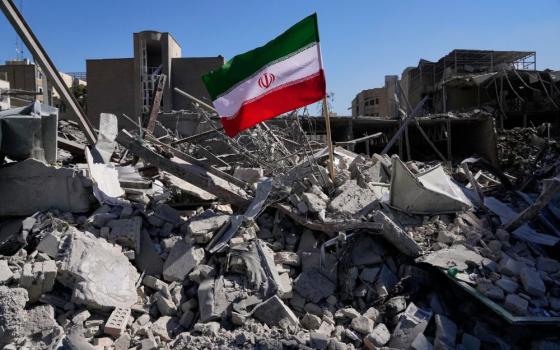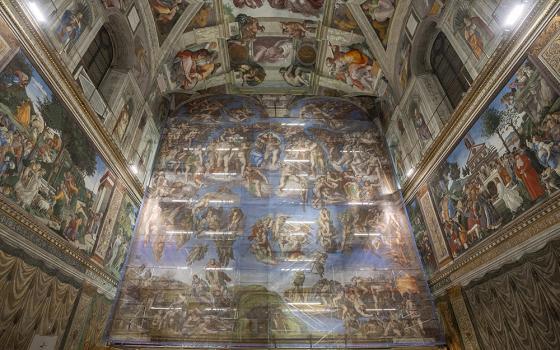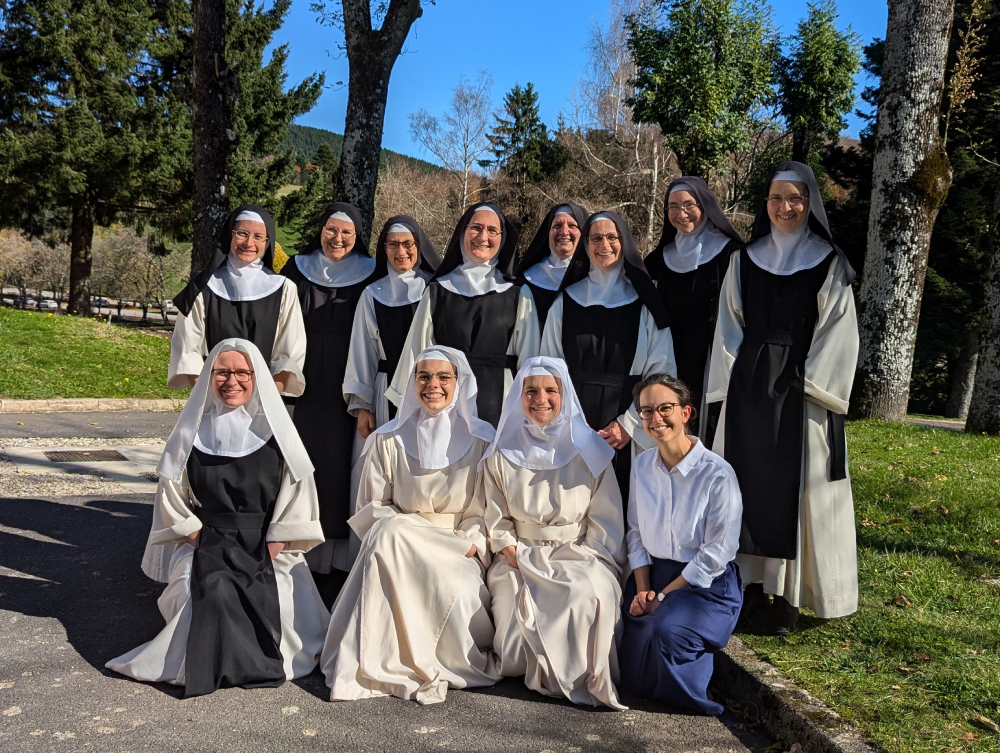
The community of Cistercian nuns of the Abbey of Notre-Dame des Neiges. (Courtesy of Abbaye Notre-Dame des Neiges)
In the Vivarais Mountains of south central France, a community of Cistercian sisters lives at 1100 meters above sea level in the Abbey of Our Lady of the Snows, or Notre-Dame des Neiges.
The sisters moved from Abbey Boulaur to the Abbey of Our Lady of the Snows in December 2022, taking over the monastery from the Trappist monks who had lived there since 1850.
The sisters moved in order to pursue an entrepreneurial adventure to support themselves economically on 450 hectares. In March 2024, the 12 sisters founded a successful startup business of 99.9% natural cleaning products called Air des Neiges, a first in the monastic world. This innovative range of natural cleaning products is based on organically grown plants and spring water.
Mother Anne from the Abbey of Our Lady of the Snows spoke to Global Sisters Report about the abbey and its products, which the sisters describe as "a breath of nature in your home."
GSR: When you embarked on this adventure of selling household cleaning products, did you know you were going to have so much success and so many requests?
Mother Anne: No, it was a real gamble, because nobody was doing this in the monastic world at the time. So it was interesting because when you're the first, you're not competing with others. Also, you're not putting other communities in difficulty, which was important for us.
You have the space to set up in a new market to sell the products, but there's also the risk of completely missing out on the clientele and making a product that there is no interest in, and it doesn't find its market.
So we were taking a real risk, and when we first started, the first communities found it hard to order from us because they didn't know whether it would be good for their shops. They thought, "People buy cheese, beer, things you can eat or cosmetics, but not household products."
So they weren't really sure, but we were happy to see that it meets a need today, because everyone does their own housework and everyone needs quality products. Young people in particular are very sensitive to the ecological issue of preserving water, and we know that natural products are important for preserving water. So, in the end, it worked out well and continues to.
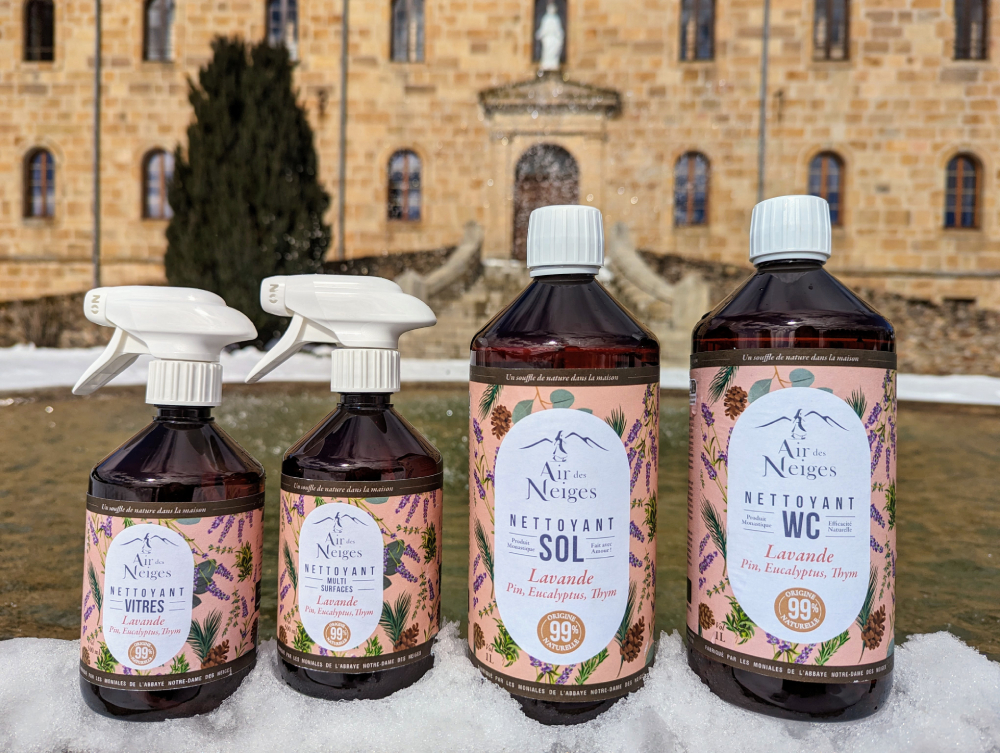
Air des Neiges, 99.9% natural cleaning products. In this photo are featured products in the scent of lavender with touches of pine, eucalyptus, and thyme. From left to right, a window cleaner, a multi-surface cleaner, a floor and a bathroom cleaner. (Courtesy of Abbaye Notre-Dame des Neiges)
You have said that this is a first in the monastic world. What do you mean by that?
Well, I don't claim to know everything that's being done all over the world. In France, of course, no one was making cleaning products. It's more or less a first in Europe because another community was making a few products, but not plant-based products; they were a bit different. … So there was a community that was already making a few household products. But it was a complete novelty in France. And to develop a complete range, to make it the economic activity of a community, that's a novelty because nobody had dared to take such a gamble.
Given that the products are sold both in person and online, are the products sold throughout Europe?
Well, unfortunately at the moment we don't have approval to sell throughout Europe. So we're only selling in France. We're going to see how the sales develop, and if we have the possibility of obtaining European approval, we'll apply for it and then go outside Europe. However, personally, I don't think we'll do that, because it's going to be very complicated administratively, and then there are taxes.
But maybe with Europe, because there are monasteries in Switzerland and Belgium that have told us they'd like to sell our products in Spain too. So maybe we'll work on getting approval for Europe.
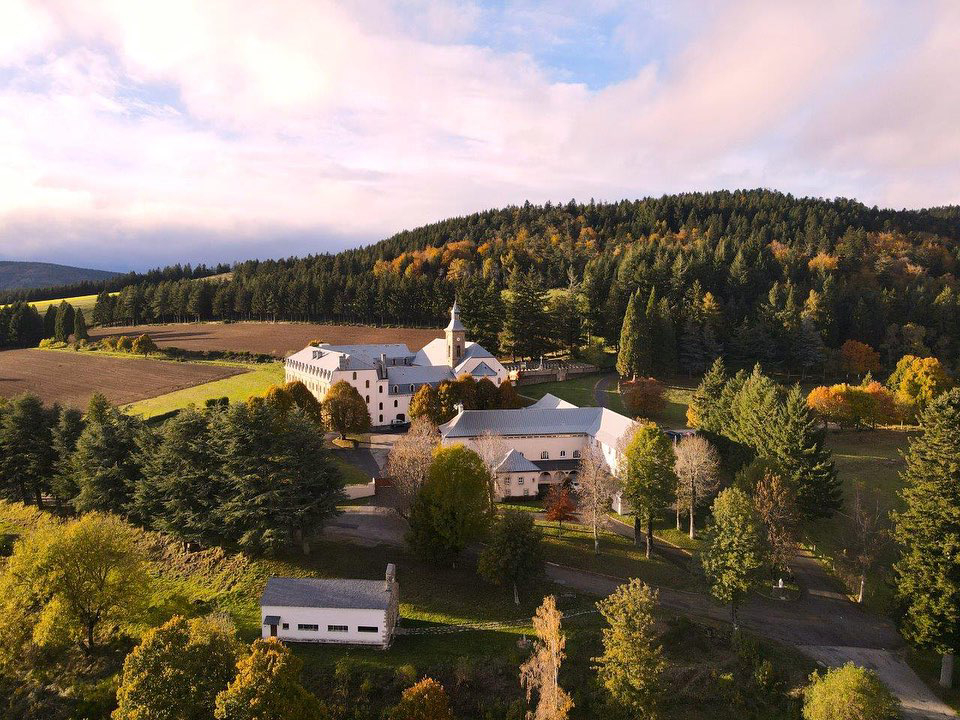
Aerial view of Notre Dame des Neiges. (Courtesy of Abbaye Notre-Dame des Neiges)
Are you able to disclose a percentage or a number of products you have sold?
First of all, we're still in the very early stages, so it's complicated to see how things are progressing because of the launch.
The difficulty is that we had a difficult blow for the community four months ago. On Oct. 17, we were hit by severe flooding, which destroyed more than 80% of the stock of our products, which we had been making for the previous six months. So for the last four months, we have not been able to sell the products to our retailers. We were only able to resume shipments last week. So, for four months we've had an interruption, not at all at the right time for launching a business, that's for sure.
Fortunately, we have a sympathetic clientele, so now I get to edit a short video that I've started to prepare to tell the abbeys that we can start to sell the products again and if you're not selling them yet, to help us by selling them, etc.
Do you have any figures to share with the public in terms of sales?
We have achieved sales of €176,000 excluding tax for the Air des Neiges business in its first year, and we hope to double this figure in the future.
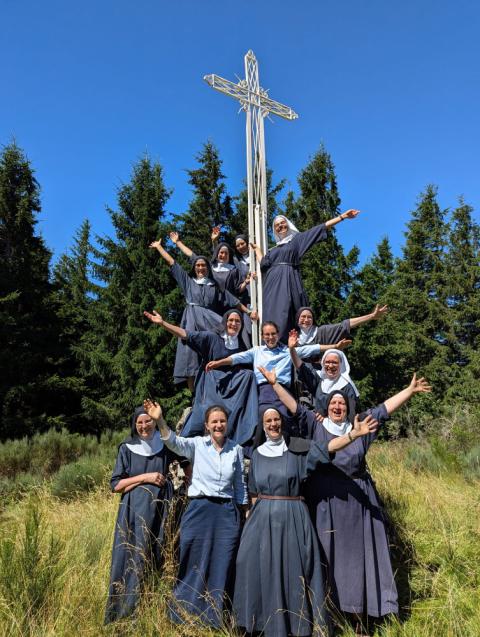
The community announces the launch of their new website on Facebook, December 19th, 2024. (Courtesy of Abbaye Notre-Dame des Neiges)
Let's talk a bit about you, your tasks and how you are involved in the business.
At Air des Neiges, I play the role of a manager. I coordinate the teams, I divide the work between the sisters and I give direction by talking about it with the community. We talk to each other a lot and I manage all the communication.
I'm also the one who responds to journalists, who writes the articles (if I'm asked to do so in certain cases), or who runs social networks such as Facebook and Instagram. I also make the flyers or the graphics. However, I'm not the one who makes the labels; we hired a graphic designer for that.
The bulk of my work is to coordinate and support the sisters in their own work.
Not everyone goes into business, including laypeople. People go to school and do courses in business, marketing, administration and so on. With that being said, have you had any training at all, or did you just throw yourself into it?
Personally, I didn't study marketing or management at all — I studied French literature. The advantage of this is that it taught me to write, to express my ideas properly and to think. Therefore, in the end, these studies seemed to me to be very useful.
I've also been very lucky in my monastic life, because since I've been a nun, as I was saying for 23 years now, I've already had a wide variety of tasks, both more directly spiritual. For example, I was mistress of novices for several years, and I was also superior of our first foundation at Abbey Rieunette near Carcassonne.
Advertisement
… And there are people both inside and outside the community who can help us draw up a business plan. Therefore, we've set up little committees that can help us with fundraising, that can help us with the business and the economic model, and that can help us with marketing. They're not the ones who do all the work, but at least they know how to put us in touch with the right advisers and the right companies, and that's going to draw our attention to the fact that you really should be doing this with someone else.
I see my work above all as knowing how to work with others, which allows me to succeed in accomplishing it, both with my sisters, entrusting them with responsibilities to motivate them, and with lay people who can lend us a hand with competence and professionalism when we need help.
Why was it important for the products to be 99.9% natural? Did you come up with this idea?
We worked with a company called Phytogers, which helped us launch the business, and they chose to look for 100% natural products. To begin with, the products were 100% natural, with just one tiny ingredient: a stabilizer to prevent the product from turning brown, to keep the molecules stable, which is derived from plants. It was classified as a natural product, but due to the recent regulations, it changed.
But we can consider that we have 100% natural products, and that was the direction that was strongly given by the company that worked with us, and we've adopted their recipes.
In a way, we embraced their project because it also made sense for us — you've probably seen photos of the Abbey of Our Lady of the Snows — we're in an extraordinarily beautiful and well-preserved site. So for us, as beneficiaries of these magnificent green spaces, it was ethically responsible to preserve the environment to the maximum of our ability, and so it made sense to go down that route.
What is your vision for the future of the company?
Next year we're planning to build a laboratory so that we can manufacture all our products on-site, because from the end of this year, we need to be completely autonomous in production. So we're obviously planning to expand our business, but we're a global company. So there are elements of our business that correspond to the constraints of any startup, but there are also elements that are outside these frameworks and considerations.
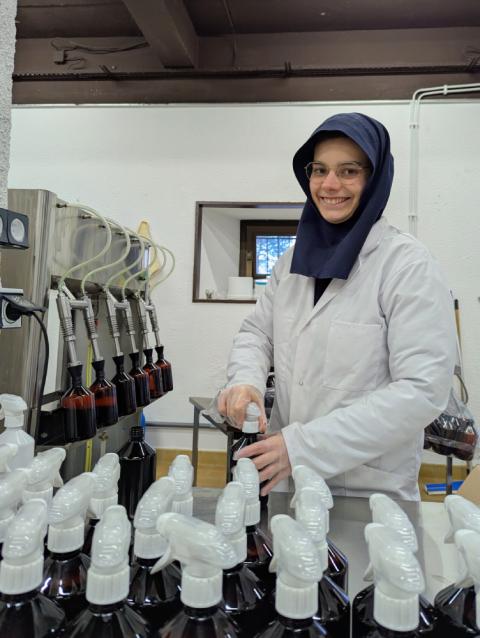
A novice packages products in the Air des Neiges laboratory. (Courtesy of Abbaye Notre-Dame des Neiges)
In concrete terms, our aim is not to make money with this company, it's to earn a living, which is not the same thing. Earning a living means earning what we need to live and run the business, but it also means quite simply, as the expression goes, "earning a living." In other words, an activity that is a source of life for the community, vitality, energy and joy, in the strongest sense.
So that means that in developing the Air Des Neiges range, we're going to be concerned with generating life. This means creating new recipes, innovating, doing a bit of research and making each sister responsible.
But it also means that our whole life is not going to revolve around this alone.
We are keen to develop other activities that will enable the community not to, as we say in France, "put all our eggs in one basket" with the risk that everything will go wrong if the basket falls all at once. Not putting all our eggs in one basket also means diversifying our economic activities. So today, in addition to the Air des Neiges product range, Notre Dame des Neiges has a monastic guest house, a hikers' center and a shop.
Also, we'd like to be able to process meat from our cows and we'd like to have a pig farm so that we can make sausages and charcuterie, as well as develop a range of natural drinks based on plants from the mountains, in the same spirit as the Air des Neiges products, but in the form of non-alcoholic drinks that are good for your health.
They would allow you to spend a pleasant moment drinking something good, a bit like lemonade with spring water from our mountains. It's a project we're currently working on at a fairly early stage because we'd also like to produce at least some of the plants that will go into these drinks.
We'd like to be able to distill or have distilled at least part of, for example, for Air des Neiges products, fir trees from some of the property's trees that can be used to make essential oils for today's household products.
The future of the business is the business in the broadest sense of the word, meaning the Air des Neiges business and household products, but also the business of the community in general. Everything will also depend on the young sisters whom we will welcome and the number of them we will have.





